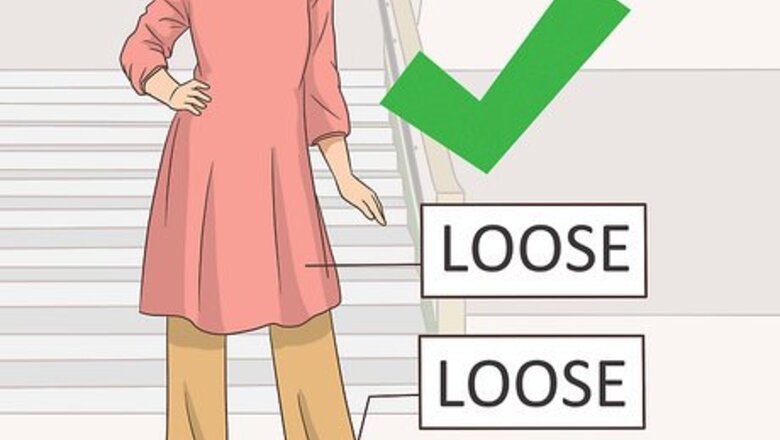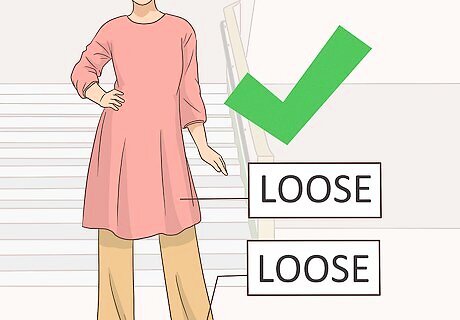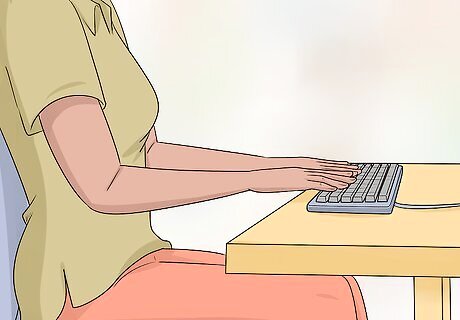
views
How to Stop Bum Sweat on Chairs

Wear breathable clothing. Choose lightweight fabrics like cotton or linen, as these allow air to circulate through the fabric and help prevent sweat build-up. Additionally, wear loose-fitting garments and avoid tight clothing, especially when working in a warm environment. Look for clothing labeled “moisture-wicking” to keep you dry. These are often synthetic fabrics like polyester, nylon, and spandex blends. Layering your clothing also helps keep your seat dry, as a lightweight base layer can distribute sweat away from your body. Layering is also good in the winter, when you need to stay warm outside but tend to sweat once you’re inside.
Place absorbent pads or liners on your chair. If you want to keep your chair sweat-free, consider placing an absorbent fabric over the cushion. Choose a disposable chair pad, or use a folded microfiber towel or a square of terrycloth. These absorbent fabrics are a simple, convenient way to stay dry. Remember to change or clean your liner regularly to maintain freshness and hygiene.
Shift positions and move around periodically. Sweating often occurs when heat is trapped in and around your body, and sitting in the same position without moving often increases this. Try switching up your sitting position every few minutes or whenever you feel uncomfortable to increase airflow around your bum.
Try standing up to work. Sitting for hours at a time traps heat around your backside and causes sweat to build up. If you can, try working while standing up. Using a standing desk not only keeps the air flowing freely around you, but it keeps your body moving. The more you stand, the less likely you’ll sweat through to your chair.
Take short breaks and walk around. Like working at a standing desk, taking quick breaks and moving around your office helps increase airflow and keep your body cool. Depending on how much you sweat, take a short lap every 30 minutes to an hour to prevent excessive sweating.
Get a cooling gel cushion. If you need to sit in the same position for long periods of time, consider buying a cooling gel cushion to place in your chair. These cushions have a honeycomb texture that allows air to circulate, even when you’re sitting for a long time.
Use a fan for air circulation. Air circulation is extremely important for staying cool, especially in humid or warm environments. Set up a portable fan near your desk, or if you have a ceiling fan, turn it on to increase airflow. Weather permitting, open windows and doors to create a cross breeze. Additionally, running an air conditioner or dehumidifier helps control the temperature and humidity of the room.
Avoid leather chairs and opt for mesh. If you’re in a situation where you can choose your chair, go for a mesh option to promote airflow and keep your backside cool. It’s best to avoid leather chairs if possible, as leather is non-porous and doesn’t allow air to circulate, which leads to more sweating.
Maintain personal hygiene. Staying clean is an important factor in preventing bum sweat. Take regular showers and clean your backside well to remove sweat, bacteria, and oils that can lead to odor and discomfort. Use gentle, pH-balanced cleansers and dry your buttocks well to prevent sweat build-up. Additionally, be sure to wipe thoroughly after using the bathroom and change out of sweaty or damp underwear as soon as possible.
Drink water to stay hydrated. If you’re dehydrated, you may sweat more as your body attempts to cool down. Staying hydrated helps regulate your body temperature, so drink plenty of water throughout the day. Not only will it help you stop sweating, but it will help replace the fluids lost from sweating.
Common Causes of Bum Sweat

Prolonged sitting and modern lifestyles Because so many of us have to sit for hours at a time (due to work or school), bum sweat can happen to practically anyone. If certain parts of our bodies don’t get enough airflow, we’ll start sweating so our bodies can cool down. Additionally, wearing clothes made of heavy or thick fabric can speed up this process, so opting for natural, breathable fabrics can help.
Genetics and sweat gland distribution Because everyone’s body is different, some people may naturally sweat more than others. Our unique genetic makeup can affect how much and how often we sweat, and the location and density of sweat glands vary. Everyone experiences bum sweat—some just sweat more than others. The human body has 2 types of sweat glands: eccrine and apocrine. Eccrine glands produce an odorless mixture of water and salt to cool you down, while apocrine glands produce the smelly substance we typically associate with sweating. Your bum only contains eccrine glands, so butt sweat alone doesn’t have an odor.
Feeling stressed or nervous Sweating doesn’t only happen when you’re too hot. If you’re under a lot of pressure or feel particularly anxious, you may sweat as a stress response. This may occur when you’re having an important meeting with your boss or have to deliver a speech at school. If you notice your bum sweat gets worse when you’re nervous, try to relax and take deep, calming breaths. If you can, listen to your favorite music or try meditating to reduce your anxiety.
Body fat percentage Anyone can experience bum sweat, but sometimes, having a higher percentage of body fat can increase how much and how often you sweat. If this is the case, eating healthy, balanced meals and exercising regularly can sometimes help.
Dietary factors In some cases, eating spicy foods or consuming alcohol or caffeine can increase sweating. If you’ve noticed spicy or acidic foods tend to make you sweat more, try to avoid eating them when you know you’re going to be in a situation where you don’t want to sweat.
Benefits of Preventing Bum Sweat

Increased comfort Being sweaty in general is uncomfortable, but having a damp backside or seat can be particularly so. When you prevent bum sweat, you’ll be able to work comfortably for longer periods of time without having to worry about changing your clothes.
Odor control Your backside only has odorless sweat glands, but you may still experience odor if other areas of your body are sweating, especially if they’re near your backside. By controlling bum sweat, you’ll likely decrease the amount of sweating in other areas, too, so you won’t have to worry about smelling bad or constantly reapplying deodorant. Even if the actual sweat doesn’t produce an odor, it’s still important to maintain hygiene. Always clean your bum properly to ensure you smell your best.
Improved skin conditions Excessive sweating can sometimes cause itching and inflamed, irritated skin. It may also lead to breakouts when you normally have clear skin. If you notice irritated skin around your backside, it should begin to clear up once you’ve taken the measures to prevent bum sweat.
Confidence boost Sweating is a natural bodily function, so it’s nothing to be embarrassed about. However, it’s completely understandable if you do feel a bit self-conscious about leaving sweat stains in your chair. By preventing bum sweat, you’ll likely feel more confident about going to work, school, or anywhere else you’ll need to sit for long periods of time.
When to See a Doctor

Talk to your doctor if your sweating affects your daily life. If your body sweats more than it needs to regulate your temperature, you may have a condition called hyperhidrosis, in which you seem to sweat for no apparent reason. If sweating is negatively impacting your life, seek medical help to find a treatment that will work for you. Hyperhidrosis can be genetic, or it can be caused by certain medications. In most cases, excessive sweating isn’t dangerous, just inconvenient and potentially embarrassing.




















Comments
0 comment